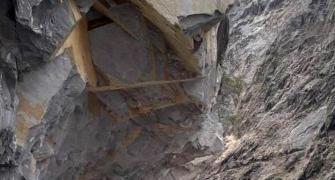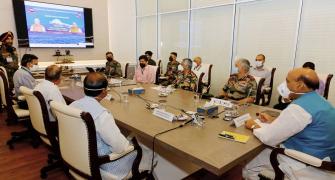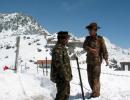Nepal's Cabinet has endorsed a new political map showing Lipulekh, Kalapani and Limpiyadhura under its territory, amidst a border dispute with India.

The move announced by foreign minister Pradeep Kumar Gyawali came weeks after he said that efforts were on to resolve the border issue with India through diplomatic initiatives.
Nepal's ruling Nepal Communist Party lawmakers have also tabled a special resolution in Parliament demanding return of Nepal's territory in Kalapani, Limpiyadhura and Lipulekh.
The Lipulekh pass is a far western point near Kalapani, a disputed border area between Nepal and India.
Both India and Nepal claim Kalapani as an integral part of their territory -- India as part of Uttarakhand's Pithoragarh district and Nepal as part of Dharchula district.
Gyawali said that the official map of Nepal will soon be made public by the ministry of land management.
“Decision of the Council of Ministers to publish the map of Nepal in 7 provinces, 77 districts and 753 local level administrative divisions including Limpiyadhura, Lipulekh and Kalapani,” he wrote on Twitter on Monday.
Gyawali last week summoned the Indian Ambassador Vinay Mohan Kwatra and handed over a diplomatic note to him to protest against the construction of a key road connecting the Lipulekh pass with Dharchula in Uttarakhand.
India has said that the recently-inaugurated road section in Pithoragarh district in Uttarakhand lies completely within its territory.
Nepal's finance minister and government spokesperson Yuvaraj Khatiwada on Monday said that the Cabinet headed by Prime Minister K P Sharma Oli has approved the new political map of the country.
It was presented by minister for land management Padma Aryal at a Cabinet meeting for endorsement at the official residence of Prime Minister Oli at Baluwatar in Kathmandu on Monday.
The government said it will soon publicise the new political map that incorporates the territories unilaterally kept by India on its side of the border.
Minister for culture, tourism and civil aviation Yogesh Bhattarai said that the Cabinet's decision will be written in golden letters.
However, senior Nepal Communist Party and member of Nepal Communist Party Standing Committee Ganesh Shah said the new move may escalate unnecessary tension between Nepal and India at a time when the country is fighting the coronavirus.
"The Nepal government should soon start a dialogue with India to resolve the matter through political and diplomatic moves," he said.
The new map includes 335-km land area including Limpiyadhura in the Nepalese territory.
The new map was drawn on the basis of the Sugauli Treaty of 1816 signed between Nepal and then the British India government and other relevant documents, which suggests Limpiyadhura, from where the Kali river originated, is Nepal's border with India, The Kathmandu Post quoted an official at the ministry of land reform and management as saying.
President Bidhya Bhandari, addressing Parliament last week, reiterated that Limpiyadhura, Kalapani and Lipulekh belong to Nepal and appropriate diplomatic measures will be adopted to resolve the existing issues with India.
India and Nepal are at a row after the Indian side issued a new political map incorporating Kalapani and Lipulekh on its side of the border in October last year.
The tension further escalated after India inaugurated a road link connecting Kailash Mansarovar, a holy pilgrimage site situated at Tibet, China, that passes through the territory belonging to Nepal.
The 80-Km new road inaugurated by defence minister Rajnath Singh earlier this month is expected to help pilgrims visiting Kailash-Mansarovar in Tibet in China as it is around 90 kms from the Lipulekh pass.
"The road follows the pre-existing route used by the pilgrims of the Kailash Mansarovar Yatra," spokesperson of the ministry of external affairs Anurag Srivastava said in New Delhi recently.










